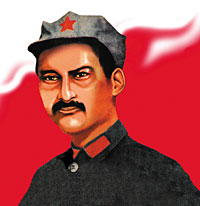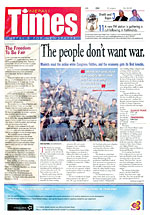 |
 SUBHAS RAI |
Nepal is a semi-feudal and semi-colonial country. And MLM (Marxism-Leninism-Maoism) says that in oppressed countries like this, in general, a revolutionary objective situation prevails?When the Great Proletarian Cultural Revolution was initiated in China under the leadership of the great Comrade Mao, it directly impacted on the revolution in Nepal. There were so many materials from the Chinese Cultural Revolution that came to Nepal?inspired mainly the younger generation of communists and the masses.
In 1986 only the Communist Party of Peru had finalised MLM as the party ideology. We had some documents from the PCP. We had a debate to adopt MLM as our ideology?this is our ideological, political and subjective basis?
We found the mountainous region in Nepal is very favourable for guerrilla warfare, for People's War?we also looked at the fact that we are surrounded on three sides by this big Indian country.
The West (of Nepal) is historically, geographically, and culturally the basin of this revolution. It is the main point for the revolution - the people here are more oppressed by the ruling classes, and the government in Kathmandu is very far from here.
In making the plan for the initiation there was great debate over how to go to the armed struggle because many people were influenced by 'peaceful' struggle, work in the parliament, rightist and petty bourgeois feelings and a long tradition of the reformist movement. Then we said that only the process must be a big push, big leap. Not gradual change. Our view was we should declare freely and frankly that we have initiated the People's War and that is the only alternative left for the people, for their emancipation, for their independence from brutal imperialists.
And in the plan for initiation we had a military plan to attack the police force, the landlords, the local goons in rural areas. But we did not have a big plan for sabotage in the capital because, at that time, we did not want to create a situation where with one strike the intellectuals would go away from us. We wanted to sustain their support.
The intellectuals' instinctive tendency is that we have to learn all these things, we should read everything?and then we can make war. But we said no, this is not Maoism. This is not Marxism. This is not dialectical materialism. This is not according to the scientific theory of knowledge. The question is learning war through war.
 |
We have to prepare for that. And for that reason we are saying we will also need a particular international situation. And for us this has to do mainly with India, Indian expansionism. We declare we have made a base area then formally we will make a central government, a People's Republic of Nepal: the government of the People's Republic of Nepal.
My main thrust is that I hate revisionism, I seriously hate revisionism. And I never compromise with revisionism. I fought and fought again with revisionism?
And from the economic, cultural and political basis, we see that a new wave of world revolution is beginning. This is fact. We have to grasp this question because just like Mao said, there will be 50 to 100 years of great turmoil and great transformation?


